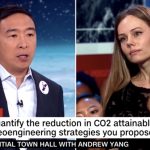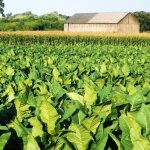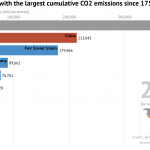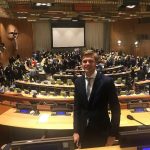
Come hear about the many ways that water and climate are interlinked, conveyed in plain language, by students in the M.A in Climate and Society, a program in the Department of Earth and Environmental Sciences.

Climate change is the biggest problem we face, and it doesn’t fit neatly in a disciplinary silo. I’m excited to work with students who are ready to reach across boundaries and give them the skills they need to change the world!

Last Wednesday, CNN held a historic climate town hall with Democratic presidential candidates, and C+S was there to represent in full force. Two current students and one alum were selected to ask questions about the most pressing problem facing humanity today. Their questions perfectly encapsulated what the program is about.

Climate change is already having negative impacts on our society, including on big business. Most businesses are focusing on how to reduce the impacts and losses driven by climate change, but some businesses are thinking about how they could profit off climate change.

Finance a role to play in confronting climate change, and green bonds could be one of the tools to do it. The idea behind green bonds is not complicated, but the application of this simple financial mechanism could be transformational.

The sprouting of daffodils, magnolias, and cherry blossoms serve as cues to put away puffy coats and happily say goodbye to winter. But for more than 50 million Americans (myself included), the beautiful flowers also signal something else: the arrival of spring allergy season. Sadly, the sniffles will only get louder. As the world warms, pollen allergies will likely get worse.

Far from being an artifact of the Age of Discovery, colonialism underpins our global economic system, one predicated on overconsumption and disregard for planetary boundaries. This colonial legacy allowed the U.S. and other developed nations to accumulate wealth, influence, and a massive debt of carbon emissions. Yet these wealthy and powerful countries now have a chance to address the damage done by acknowledging colonialism’s legacy and acting on climate change.

Over 50 percent of Americans believe they won’t be personally affected by climate change. In reality, climate change influences an increasing number of extreme weather events around the world. Most every person has experienced at least one event in their lives that was exacerbated by climate change, and the Thomas Fire was the first time I really felt the sting of climate change in my life.

As someone who works on climate change and occasionally interacts with climate deniers, I think a lot about how we communicate with people who don’t fully subscribe to the warnings of climate experts, and I wonder whether this experience might inform a better approach.

What do you get when you mix ambition, young people and multilateralism? You get the United Nations (UN) Youth Economic and Social (ECOSOC) Forum, a melting pot of ideas, good intentions and at times poor execution. I had the opportunity to attend this year’s forum in April and got to understand the role of young people when it comes to political discourse and climate action.













